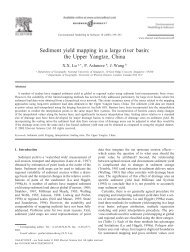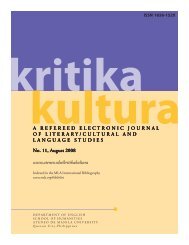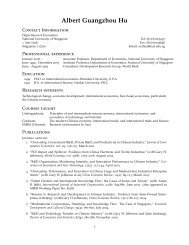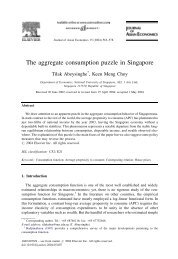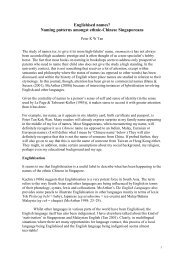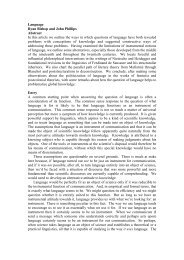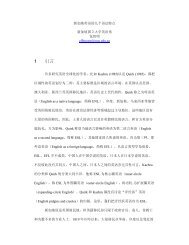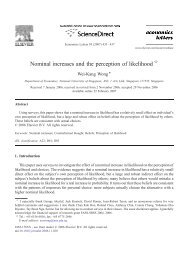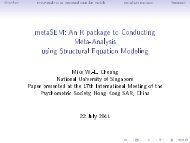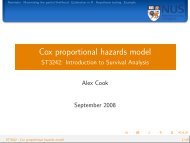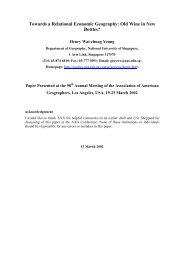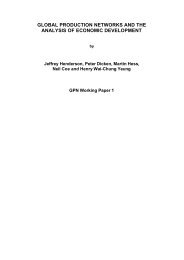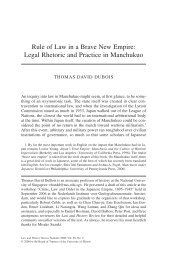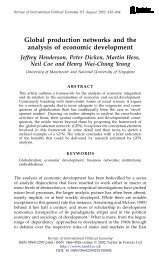Researching Hybridity in Social and Economic ... - NUS Home
Researching Hybridity in Social and Economic ... - NUS Home
Researching Hybridity in Social and Economic ... - NUS Home
Create successful ePaper yourself
Turn your PDF publications into a flip-book with our unique Google optimized e-Paper software.
Implications for politics <strong>and</strong> practice <strong>in</strong> economic geography<br />
There are no explicit conclusions <strong>in</strong> this methodological reflection on my torturous<br />
journey of research<strong>in</strong>g hybridity <strong>in</strong> Ch<strong>in</strong>ese capitalism. There are, however, several<br />
implications for how we might th<strong>in</strong>k about politics <strong>and</strong> practice <strong>in</strong> economic geography.<br />
While it is almost axiomatic these days to say that research is not a neutral act, I th<strong>in</strong>k it<br />
rema<strong>in</strong>s imperative for practic<strong>in</strong>g social <strong>and</strong> economic geographers to recognize their own<br />
positionality <strong>in</strong> any research projects (see also Yeung <strong>and</strong> L<strong>in</strong>, 2003; Kong, 2004). Had I been<br />
more aware of my positionality <strong>in</strong> the early days of my research <strong>in</strong>to Ch<strong>in</strong>ese capitalism, I<br />
would have saved many pages of journal space that were filled up by my various texts on the<br />
cultural predisposition of Ch<strong>in</strong>ese bus<strong>in</strong>ess networks! I should have been more aware of how<br />
my own positionality shaped my “oversocialized” <strong>and</strong> over-embedded view of Ch<strong>in</strong>ese<br />
capitalism. After all, my perceived advantage as an ethnic Ch<strong>in</strong>ese did not turn out to be<br />
advantageous at all – I was <strong>in</strong>deed “locked <strong>in</strong>” by the culturalist worldview of the ethnic<br />
economy. If recogniz<strong>in</strong>g one’s positionality is paramount <strong>in</strong> the reflexive research process,<br />
not fall<strong>in</strong>g victim to established methodological procedures is another. I should not <strong>and</strong> did<br />
not have to start my research <strong>in</strong>to Ch<strong>in</strong>ese capitalism with bus<strong>in</strong>ess firms, even though the<br />
heyday of economic geography then was primarily concerned with <strong>in</strong>dustrial firms. With<br />
h<strong>in</strong>dsight aga<strong>in</strong>, I could have taken a rather different methodological route to adopt, for<br />
example, a qualitatively social network analysis <strong>in</strong> the spirit of actor network theory (see<br />
Kilduff <strong>and</strong> Tsai, 2003). I could have delved <strong>in</strong>to the hybrid identities of second- <strong>and</strong> third-<br />
generation Ch<strong>in</strong>ese entrepreneurs most of whom received their tertiary education <strong>in</strong> English-<br />
speak<strong>in</strong>g countries <strong>and</strong> have tremendous <strong>in</strong>ternational bus<strong>in</strong>ess experience. And the wish list<br />
goes on <strong>and</strong> on…<br />
My po<strong>in</strong>t here though is that economic geographers should be open to methodological<br />
experimentation; we should not stay with<strong>in</strong> our methodological “comfort zones” as those<br />
25



